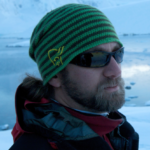AND HOW YOU CAN BE PART OF IT WITH AN INTERNATIONAL TEAM OF MARINE BIOLOGISTS
Together with our guests, we fund and assist ongoing scientific research aboard One Ocean Expeditions’ vessels. This important work ranges from collecting data for critical meteorological and oceanographic studies to the tagging and tracking of migrant whale populations. The information is used for international university and science research on global change.
For humpback, killer and minke whales, February and March is a time of great activity in Antarctica. Dr. Ari Friedlaender, from Oregon State University, and his international research partners share their research results with passengers, encouraging them to participate in ongoing cetacean sighting programs. Their guidance provides a valuable and fascinating insight into the world of Antarctic science with an underlying message of conservation through education and inspiring experiences.
“One of the most critical parts of our science is being able to better communicate our findings with the broader community. Our tag and drone work* will be presented to passengers on the One Ocean Expeditions’ ships. We will be able to show images of whales from above and how they behave as well as animal-borne video from our tags. This unique perspective will allow both scientists and passengers to share the amazing lives of whales in Antarctica,” states Ari Friedlaender.

For the first time, One Ocean Expeditions will carry an extended number of marine mammal scientists to Antarctica, to help collect data and samples in a global research collaboration. “During the 2016/2017 Antarctic season, we will continue to work on scientific research projects to better understand the behavior and population structure of humpback and minke whales. In particular, we will be using newly designed multi-sensor video recording tags to measure the underwater feeding behavior of each species and literally see, from a whale’s perspective, how it navigates the icy Antarctic waters. Overhead images from drones will allow us to measure the size and health of individual whales as well as determine if they are pregnant and which breeding population they represent. This information is necessary to determine the growth rate and health of Antarctic whale populations. This year, we will be working with scientists from the Australian Antarctic Division, Stanford University, University of California at Santa Cruz and Oregon State University,” said Ari Friedlaender.
 Dr. Ari Friedlaender, Marine Biologist
Dr. Ari Friedlaender, Marine Biologist
Achieving outstanding research results in his field as a globally connected marine biologist, Ari Friedlaender’s projects are regularly supported by One Ocean Expeditions. With a Ph.D. in Ecology from Duke University and currently employed as an Associate Professor at Oregon State University’s Marine Mammal Institute, he is actively engaged with the non-science public to share the importance of his studies. Through collaborations with Geographical Societies, Smithsonian Institute, BBC, and other foundations, Ari shares information and promotes ocean conservation. One Ocean Expeditions’ passengers on board will benefit from his exceptional presentation skills, breaking down complex marine research projects in engaging and fascinating presentations.
Mike Double, Marine Biologist
As the leader of the Australian Marine Mammal Centre, Mike has a tremendous opportunity to positively influence the direction, shape and quality of science that supports conservation outcomes for marine mammals. He also ensures government policy and management decisions are fully informed with the most recent scientific research. Mike is part of the international research team that will actively engage with One Ocean Expeditions passengers onboard, discussing research progress and processes.
Charles Littnan, Seal Biologist
Charles leads the National Oceanic and Atmospheric Administrations (NOAA) Hawaiian Monk Seal Research Program – the most proactive marine mammal research and recovery program in the world. Attaining a BSc in Marine Biology from Texas A&M University and a Ph.D. from Macquarie University, Charles passionately develops strategies to better engage the public on complex conservation issues, making science more interesting and accessible to local communities.
Book now to join Ari Friedlaender and his team and contact your travel agent or speak with our experts.
Looking for more information? Our agents have extensive experience and knowledge of the areas we visit. Speak with your travel agent or call our experts to learn more.
*Ari Friedlaender and his team have special permits to handle drones in Antarctica.
















One Comment
Comments are closed